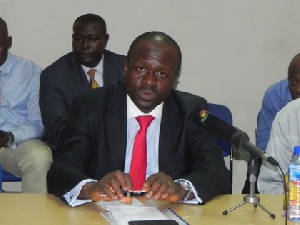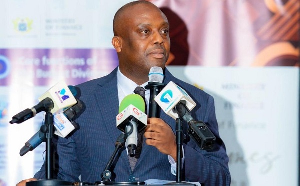Government has descended heavily on local and international media over descriptions ascribed to the country’s economy.
It said media reports recently about the country’s negotiations with the International Monetary Fund (IMF) highlighted the erroneous impression the international media – particularly Reuters and Financial Times – have of the country’s economy.
“While we appreciate the continuing interest of the media in Ghana’s affairs, we wish to correct a few basic errors of fact in these stories,” a statement issued by the Minister of Communications, Dr Edward Kofi Omane-Boamah, said.
Below is the full statement on Tuesday:
CLARIFICATION ON STORIES ON GHANA AND THE IMF
The Government of Ghana has taken note of the recent stories in the international and local media regarding its decision to open negotiations with the International Monetary Fund for assistance. While we appreciate the continuing interest of the media in Ghana’s affairs, we wish to correct a few basic errors of fact in these stories.
It was reported by Reuters on 3rd August 2014, that the Ghanaian cedi had “fallen by around 40 percent against the dollar this year”. This is incorrect. According to Bank of Ghana, the cedi traded at 2.34 against the US dollar in January 2014, and as of Friday 1st August , 2014, it stood at 3.035 to the US dollar, reflecting a cumulative depreciation of 22.9% over the period.
It was also noted that the economy grew by 7.0% in 2013, instead of the correct figure of 7.1%. While the difference may seem trivial, it is important to point out the error for two reasons: (1) to promote accuracy as a matter of record, and (2) to highlight the fact that even fractional changes in an economy have significant implications.
Similarly, the Financial Times’ headline of “Ghana Seeks IMF Help after currency falls 40%" also repeats some of the misrepresentations in the Reuters story, with some hyperbole too. The paper makes the erroneous claim – which has since been repeated by other media houses – that the cedi is “the worst performing currency in the world in 2014”. Subsequently, some commentators have twisted this headline to say that Ghana’s economy is the worst in the world, despite strong positive growth accross all sectors of the economy last year and so far this year.
As proof, the Financial Times adds that the cedi’s fall is “a bigger slide than even the war-ravaged Ukrainian hryvnia and the Syrian pound”. What it failed to mention was that unlike Ghana, which for decades has had a market-determined floating exchange rate regime as well as a liberalised capital account (which allows unhindered repatriation of profits), Syria has a fixed exchange rate regime, with capital controls. Ukraine also maintains a “managed float” regime, after years of a fixed rate regime that artificially kept the currency strong. Therefore, any comparison across these three currencies is misleading, at best.
The fact that one Ghana cedi, as of 3rd August 2014, could buy 29.5 US cent, while one Syrian pound could buy less than one US cent and one Ukrainian hryvnia bought only 8 US cents is positive proof that the Ghanaian economy is fundamentally strong and has bright medium term prospects despite its short-term challenges. We are working assiduously to address these in a "Home Grown" fiscal consolidation plan that we have already submitted to the IMF.
We wish to assure all journalists, both local and international, that our doors are always open for them to fact-check their stories with relevant sector ministries before they publish them. This would do as much good for their reputation as it would the quality of discourse that often relies on their stories.
Signed:
Edward K. Omane Boamah (Dr)
MINISTER FOR COMMUNICATIONS
General News of Wednesday, 13 August 2014
Source: tv3network.com













